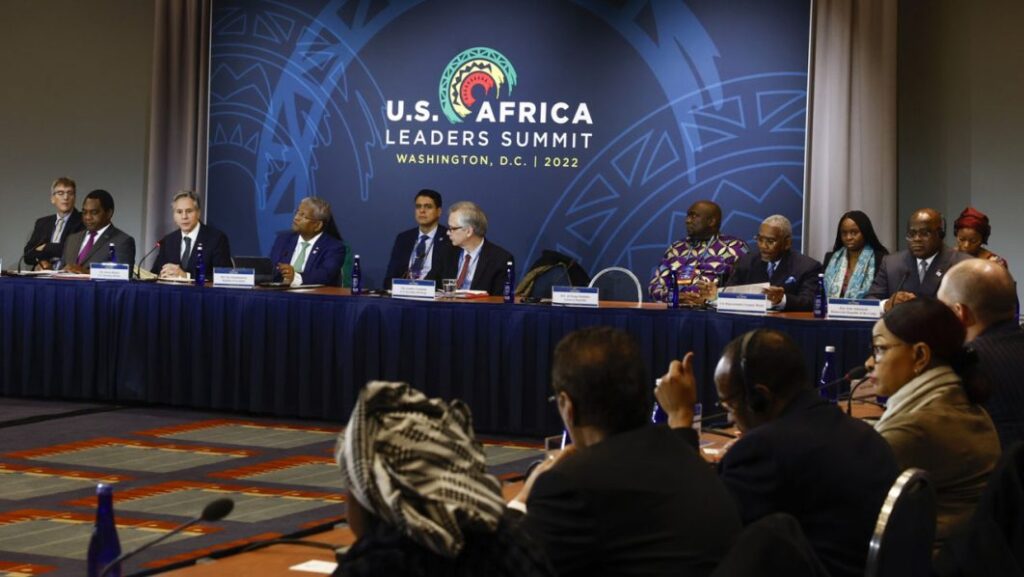
The United States and China have downplayed concerns of Africa turning into an area of competition.

African countries could use the ongoing rivalry between the United States and China to advance their own interests, with both global superpowers competing to expand their footprint in the continent, said analysts.
Their comments come as more than 40 African leaders gather in Washington this week for a key summit with the US. The meeting is said to be an effort to reset and improve US relations with Africa, with President Joe Biden looking to use personal diplomacy to win back influence.
“China will say that it’s not in competition with the United States, and the United States will say it’s not in competition with China, but we do know that both are struggling for influence across the world,” said Dr Ebenezer Obadare, a Douglas Dillon senior fellow for Africa studies at the Council on Foreign Relations.
China is using the continent as a test run for all the other plans that it has, he told CNA’s World Tonight on Wednesday (Dec 14).
“So China knows that if it’s able to secure the interests of African countries, if it’s able to increase the number of allies it has on the continent, that will help it in a strategic contest with the United States.”
The US is realising that “it is in no position to allow China to consolidate its toehold on the continent”, said Dr Obadare. “So if you look at it that way, from the point of view of Africa, it’s a very, very good time.
“African countries can leverage the competition to advance African interests. They can make requests of the United States that they probably wouldn’t have made maybe in the last 10 years.”
The US and China have downplayed concerns of Africa turning into an area of competition.
CHINESE INFLUENCE IN AFRICA
China has been a big player in Africa. It is the continent’s largest provider of foreign direct investment, pouring in roughly twice the amount of US funding.
China is also Africa’s biggest trading partner, with bilateral trade reaching a record high of US$254 billion last year. The US pales in contrast in this aspect, recording US$64 billion.
“It has a huge amount of ground to make up,” said George Washington University’s professorial lecturer David Shinn.
“I would point out that most of China’s trade with Africa is Chinese exports to Africa, not imports from Africa, whereas US-African trade is actually slightly in favour of the Africans.”
The former US ambassador to Ethiopia and Burkina Faso said the major reason for the decline in US-Africa trade is that “the US is not importing anywhere near the amount of oil that it once did from the continent”.
But some analysts believe the US is unlikely to use the ongoing US-Africa Leaders Summit to draw the African countries away from its competitors.
“I think the United States is simply trying to improve its relations with African countries on their own merits,” Dr Shinn told CNA’s Asia First on Tuesday.
“It’s not doing it as direct competition with China, although that seems to be the approach that most are taking to the summit these days.”
RESTORING LOST TRUST
The three-day summit is the first continent-wide meeting since former US president Barack Obama invited leaders in 2014.
“It is very significant for American foreign policy,” said Dr Shinn, who served for 37 years in the US Foreign Service.
“This is an opportunity to demonstrate what it is that the United States can make available to help the African states and also to reinforce to the American public the importance of the African countries, which admittedly are not well understood in the United States.”
The summit will likely see expanded trade and foreign direct investments in Africa.
It also seeks to repair strained relations with African countries, which suffered under the previous Trump administration and its “America First” foreign policy.
The new US strategy towards Sub-Saharan Africa, which outlines several objectives including fostering openness and delivering democratic and security dividends, comes out “of a particular realisation that the strategic milieu in Africa has changed, that there are new actors at play on the continent”, said Dr Obadare.
“The United States realises that it can no longer be business as usual when it comes to Africa.”
Russia’s invasion of Ukraine and its impact on various areas such as migration and food security will likely be on the agenda at the summit. Several African nations have remained neutral towards the ongoing war.
After the Russian invasion of Ukraine in February, the US found that it could no longer afford to “take African countries for granted”, noted Dr Obadare.
“I’m sure the United States would want a situation where those on the fence, at least, are persuaded to join the Western alliance.”
Dr Obadare said it is important to consider how both sides would want their ties to be when the Russia-Ukraine war comes to an end “at some point”.
“And what the United States and Western diplomats want is a situation where once the conflict itself ends, the Western countries, the United States and Africa will be on the same page,” he added.
“There’s a lot of ground to cover, and Western policymakers would want to make sure that that ground is not lost when the conflict itself is over.”
Source | cna
